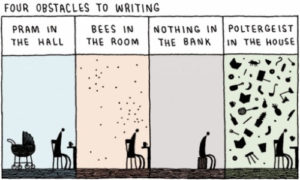 So the great mentoring pair-up is complete! If you wrote me and didn’t hear back in one way or another, then feel free to ping again because it’s possible I missed your message. Otherwise, I hope your pairing works out fabulously! I ended up having some writers who didn’t get paired up, mainly because I didn’t have mentors with the right experience for them or because my first priority was pairing up women of color (and that is mainly what people volunteered to do, so I didn’t feel comfortable pairing up otherwise). So I wish all of you guys the best of luck too! And, likewise, I have some writers who volunteered to be mentors that I didn’t end up matching. You are all fabulous; I did my best bewitched attempt to get people together who I felt would be best for both involved.
So the great mentoring pair-up is complete! If you wrote me and didn’t hear back in one way or another, then feel free to ping again because it’s possible I missed your message. Otherwise, I hope your pairing works out fabulously! I ended up having some writers who didn’t get paired up, mainly because I didn’t have mentors with the right experience for them or because my first priority was pairing up women of color (and that is mainly what people volunteered to do, so I didn’t feel comfortable pairing up otherwise). So I wish all of you guys the best of luck too! And, likewise, I have some writers who volunteered to be mentors that I didn’t end up matching. You are all fabulous; I did my best bewitched attempt to get people together who I felt would be best for both involved.
A few people wanted to know if I had any advice and so I thought I’d just type up some basic guidelines here. I probably should have done this in advance, but oh well. 😉
For Mentors:
Hey, it’s pretty awesome that you want to pay things forward and help somebody else. I don’t know a single professional writer who hasn’t been mentored along the way, and so thank you for stepping up and volunteering to help out with this project. Don’t underestimate your own experience — if you’ve finished a novel (or a bunch) and gotten an agent, sold a book or published one (or a bunch), edited books, written articles and proposals, or some combination thereof and are comfortable giving feedback and advice, well, you are 100 percent qualified to help this writer I’ve paired you with level up. Most of you writers I know doubt your own accomplishments: stop that.
Most important things: be encouraging and supportive, but honest and firm.
For Those Being Mentored:
Be open to suggestions, and be honest with your mentor if you feel they’re suggesting something that’s not right for your ms. (Play this card wisely, though, and not just because suggestions feel extreme!)
Don’t waste their time; if you agree on deadlines, let them know if you’re going to miss one early. They’re making space in their schedules to help with your work. You missing a deadline you’ve set together screws up things for you both. Also, this is a good habit to pick up now — you will need it for the rest of your career.
If you feel overwhelmed or don’t know how to attack a project, ask your mentor! That’s what they’re here for.
For both of you, ideas on how this might look, which you can absolutely tailor to meet your needs and available time!
If you’re not sure how to structure things, here are some ideas:
- Get to know each other a little — exchange info on your backgrounds.
- Assess where the mentored writer is in the process; do they have a ms. they need to revise? Has it been through edits before? Do they have a feel for their strengths and weaknesses, what they want your help with? Etc.
- Mentors have writers send you some work, and set a timeline to get back to them with notes.
- Build in some time to process the notes, and then regroup on next steps: Is this planning a revision and setting some deadlines along the way? Maybe for each 50 pages, maybe helping to plan what the revision will look like and then setting deadlines? Maybe the book is ready or close to ready, in which case, maybe it’s time to put together a query and a list of agents to send it to?
- Career advice and goal setting: Is it time to start a new project? When will you have your book ready to go out and query agents with by? Accountability and structure is a great thing for new writers to learn.
- Celebrate and commiserate: Two of the most valuable things writers can offer each other; did your writer NAIL the revision of her first ten pages, did she get a ms. request? YAY. Did she get rejected by an agent? HEY, we’ve all been there. Maybe share a story about a similar setback. Rejection, it comes for us all. 😉